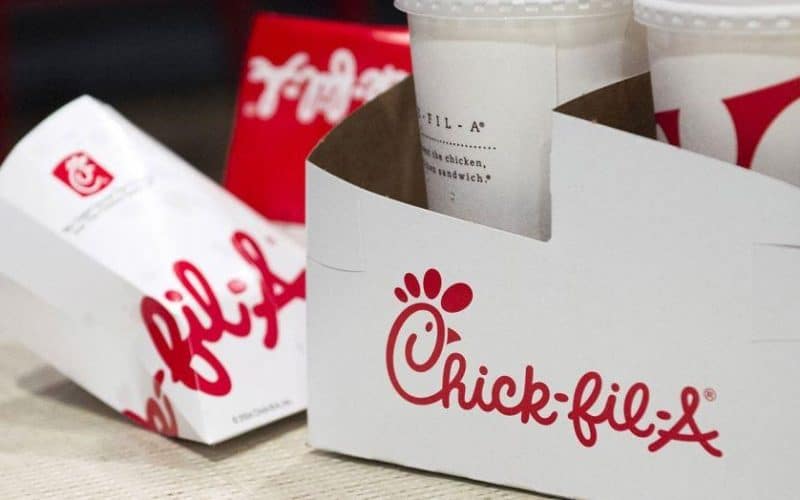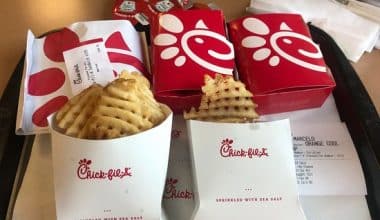The cost to open a Chick-fil-A franchise ranges from $342,990 to $1,982,225, including a $10,000 franchise fee. However, unlike most franchisors, Chick-fil-A covers all opening expenses, leaving franchisees responsible for only the $10,000 franchise fee. By a wide margin, this makes Chick-fil-A one of the least expensive major fast-food chains to join.
However, just to be sure you are making the best decision, this article will cover the cost implications of opening a Chick-Fil-a Franchise.
A Quick Look at Chick-Fil-A
Chick-fil-A is a fast-food restaurant chain in the United States. It is the world’s largest fast-food restaurant chain, specializing in chicken sandwiches. The brand operates 2,873 restaurants, the majority of which are in the United States.
Except for Alaska, Vermont, and Hawaii, Chick-fil-A operates in 47 US states and Washington, D.C. The company also has several restaurants in Canada.
Before the establishment of Chick-fil-A, the founder S. Truett Cathy opened Dwarf House in 1946, specializing in steaks and hamburgers. There are currently 12 Dwarf House restaurants open in the United States. Chick-fil-A was founded in 1967, following the success of Dwarf House. The first Chick-fil-A location opened in Atlanta.
Aside from the chicken sandwich, grilled nuggets are one of Chick-fil-A’s most popular menu items, and the company spent a whopping 50 million dollars and 7 years perfecting the recipe. The majority of the funds were used to develop a special grill by Chick-fil-A scientists.
Chick-fil-A is a privately held company that will never go public due to the founder’s last wish. Cathy signed a contract with his children that states that the chain will remain a private company, but that his children have the option to sell it.
Chick-fil-A has 35,574 employees and a revenue of $11.3 billion in 2021, according to Zippia.
What is the cost of establishing a Chick-Fil-A franchise?
In comparison to other quick-service restaurants, the franchise fee required by Chick-Fil-A to open a new franchise is quite low. The franchise fee is only $10,000 for the franchisee.
How Much Money Do You Need to Invest?
The average investment required as a franchisee is $1,661,000, which includes the initial franchise fee of $10,000.
Although this is only an average, the amount can vary depending on a variety of factors such as location, size or type of restaurant, and so on. According to the most recent FDD, the investment ranges from $518,000 to $2,804,000.
This sum reflects everything a business requires at the start. It is the sum of expenses such as opening inventory, equipment rental for the first month, lease, insurance, and additional funds for operations to cover losses in the first few months.
- The initial franchise costs is $10,000.
- Formation costs between $3,300 and $90,500.
- Operating expenses range from $505,085 to $2,702,935
- Total $518,385 – $2,803,435
What Is the Annual Revenue of a Chick-Fil-A Franchise?
A Chick-Fil-A franchise earns an average of $8,072,000 in sales per year.
This figure differs depending on whether the restaurant is in a mall ($2,694,000) or not ($8,581,000). In other words, restaurants that are not located in a mall have four times the turnover of mall units.
What Is the Profit Potential of a Chick-Fil-A Franchise?
According to the financial data in the most recent FDD, Chick-Fil-A franchises have an adjusted EBITDA margin of 21%.
Please keep in mind that this operating profit only includes COGS, labor, rent, and royalties, as well as marketing fees paid to the franchisor. We used the royalty fees and rent expenses from the FDD to arrive at this figure.
However, Chick-Fil-A does not disclose COGS or labor costs. As a result, we used industry average percentages for those two (in fact, we used McDonald’s COGS ratio of 25% and labor costs of 29%).
Using an annual sales average of $6,235,900, the average adjusted EBITDA is around $903,108 per year.
Is It a Good Idea to Buy a Chick-Fil-a Franchise?
A company’s profitability does not tell us much about whether it is a good investment. Indeed, to determine whether you should invest in a Chick-Fil-A franchise, you must compare the profits you earn vs. the upfront investment cost (the payback period).
Return on investment = Investment / Average Annual Net Profit
The average investment required to open a Chick-Fil-A franchise is $1,363,510. However, in comparison to the industry average, you earn around 15% net profit per year, i.e. $634,000 per year.
Chick-Fil-A’s payback period is only 2.2 years, which is exceptional for a franchise in general. In other words, it takes 2.2 years for a franchisee to recoup their initial investment.
So, from this perspective, we can argue that Chick-Fil-A franchises are great investments.
Generally, anything less than 4 is great.
Of course, these are averages, and your franchise payback period may differ depending on a variety of factors.
The Cost of a Chick-Fil-A Franchise (Breakdown)
Chick-fil-A franchises have relatively low startup costs. This is because, unlike other franchises, Chick-fil-A buys the real estate and all of the equipment needed to open the business and then leases it to you in the form of monthly rent payments.
That is both good and bad. On the one hand, it makes it easier for the average person to start a Chick-fil-A franchise, which is exactly what the company is aiming for. On the other hand, you will not have any equity in your company — you will own nothing other than the right to operate the franchise.
Chick-fil-A’s fees are divided into three categories: those that must be paid before or immediately after the restaurant opens, ongoing costs, and miscellaneous charges.
Initial Franchise Fees
Here’s what you can expect to begin. You will only need to be able to pay the initial fee yourself; everything else can be paid from your first few months of revenue or borrowed funds. However, keep in mind that this will reduce your take-home pay:
- The initial fee is $10,000.
- Opening inventory ranges from $18,028 to $94,560.
- The first month’s equipment rental ranges from $750 to $5,000.
- Rent for the first month ranges from $1,475 to $85,800.
- Insurance for the first month ranges from $282 to $11,165.
- Additional funds for other store-opening expenses range from $264,877 to $2,225,083.
Ongoing Franchise Fees
Chick-fil-A will charge you the following ongoing fees once you’re up and running:
- Monthly operating service fee: 15% of sales
- Renting equipment costs between $750 and $5,000 monthly.
- Monthly advertising fee: 0% to 3.25%
- Monthly rent ranges from $1,475 to $85,800.
- Insurance costs between $282 and $11,165 monthly.
- Support for hardware/software and high-speed internet: $9,500 to $20,000 annually.
- Services for cash handling systems range from $85 to $450 monthly.
Possible Additional Fees
Finally, Chick-fil-A may require you to pay additional fees on an individual basis, as outlined in its Franchise Agreement. These are some examples:
- For businesses operating as concessions, the occupancy charge ranges from 8% to 50% of sales.
- If you require advertising support and services, the fee is $100 per hour.
- If Chick-fil-A requires you to purchase certain services, the monthly fee is $300.
- Fee for using a food truck: $2,200 to $2,750 per month if you operate a Chick-fil-A food truck, plus other costs
- Credit card and gift card processing fees are paid as you incur them, based on the processing company Chick-fil-A chooses.
- Fee for food truck insurance: $320 to $400 per month if you operate a Chick-fil-A food truck.
- Fines: There are various fines for violating the terms of your contract.
- Indemnification: If Chick-fil-A is sued, you will be personally liable for any lawsuits or other damages.
- Additional franchise fee: $5,000 if Chick-fil-A agrees to let you open a second location.
- Operating services fee: Paid monthly based on a predetermined formula.
- Late payment interest: Pay the maximum interest rate permitted by your state’s laws (1.25% per month if your state does not specify this).
- Cost of performance reimbursement: If the company needs to come in and run your restaurant for you due to your mismanagement, it will bill you for it.
- If your contract expires and you do not vacate Chick-fil-A’s location on time, you will be charged fees equal to double the base rent plus an additional charge.
As you can see, the startup costs for a Chick-fil-A franchise are low, but the ongoing costs are quite high. Chick-fil-A also makes it simple to get started because, unlike most other fast food chain franchises, there are no net worth or liquid asset requirements.
Chick-Fil-A Franchise Alternatives
Because of Chick-fil-A’s strict vision and requirements, it may not always be the best fit for aspiring franchise owners. In comparison, here are the costs to get started with a few other options:
McDonald’s
- The initial fee is $45,000.
- Total investment ranges from $1,314,500 to $2,306,500.
- Liquid assets of $500,000 or more
Pizza Hut’s
- The initial fee is USD 25,000.
- Total investment ranges from $534,000 to $2,063,500.
- Liquid assets of $350,000 or more
Panera
- The initial fee is $35,000
- Total investment ranges from $1,117,000 to $3,464,000.
- Liquid assets of $3,000,000 or more
Chick-fil-A Franchise Requirements
Even if you have the $10,000 initial investment, becoming a Chick-fil-A franchise owner is a highly selective process. Take a look at their specifications below.
#1. Differentiated Application
Chick-fil-A has a lengthy application process that begins with a tiered system.
- Tier 1: A simple application in which you will be asked for some basic information.
- Tier 2: Information on prior work experience, leadership, financial health, and preferred location.
- Tier 3: The selection procedure
It is worth noting that Chick-fil-A is a very selective fast-food franchise. Approximately 40,000 applications are submitted annually, but only about 100 prospective franchise operators are chosen to move forward.
#2. Interviews (Virtual and In-Person)
Prepare to be patient if you get to the interview stage. According to some interviewees, this process can take months or even a year. Interviews can take place over the phone, via video, or in person.
Chick-fil-A interviewers take their time because they want to get a sense of who you are as a whole person. The fast-food restaurant adheres to the values instilled by its founder, S. Truett Cathy, and they want to make certain that everyone involved in the franchise is on the same page.
Chick-fil-A values include the following:
- Providing service to the customer
- Community service
- Work-life balance (hence the Sunday closure)
- DEI (Diversity, Equity, and Inclusion) Commitment
- Providing equal access
- Considering differences
- Developing a sense of belonging
- Intention, humility, and optimism
Chick-fil-A seeks a franchisee who is committed to their store and the Chick-fil-A mission. If this describes you, you have a better chance of progressing to step three.
The selection process is rigorous, and Chick-fil-A reserves the right to terminate your interview at any time, which explains why their selection rate is so low.
#3. Final Decision
If you are chosen as one of the 0.001% to advance, Chick-fil-A will congratulate you and inform you of the next steps. You will be given additional information about the rest of the process and financials before beginning your Chick-fil-A multi-week training program.
If you believe you have what it takes to go through the rigorous Chick-fil-A selection process, keep reading for more information on investing in Chick-fil-A.
What You Should Know Before Buying Chick-fil-A
Chick-fil-A appears to be a no-brainer for an excellent investment opportunity. But is this the case? Before “buying” one of the chicken sandwich franchises, you should be aware of the following five facts.
#1. Chick-fil-A wants more power than other fast-food companies
Chick-fil-A doesn’t call the people who run its restaurants “franchisees,” but rather “operators,” which better describes their role in the company.
Furthermore, operators generally do not “own” the franchise or hold equity in it, and the location is chosen by Chick-fil-A corporate.
Furthermore, the franchise agreement is personal to the person who passed the application process; the business cannot be sold or passed on to other family members.
So, if you want to buy a franchise and then sell it, Chick-fil-A isn’t for you.
#2. Chick-fil-A covers (almost) all of the startup costs
If you’re wondering why anyone would consider buying a Chick-fil-A franchise when you can’t own one, this is a compelling reason.
Chick-fil-A chooses the location, purchases the real estate, builds the restaurant, and purchases the equipment because the company wants to retain ownership of the franchise.
The only cost is a $10,000 franchise fee.
Compare this to McDonald’s, where you’ll need at least $1 million to open a location, or Culver’s, where you could need more than $4 million.
Chick-fil-A’s absurdly low price tag contributes to its accessibility, despite its unusual business model and low acceptance rates (more on that later). It’s a big part of why it’s so successful.
#3. Chick-fil-A is not a long-term investment
Chick-fil-A stands out in this regard. If you’re thinking about opening a Chick-fil-A restaurant solely as a good investment or to help you transition to something else in the future, the company isn’t interested in letting you run one of its locations.
Instead, their website states:
“The Chick-fil-A franchise opportunity requires that the individual be free of any other active business ventures and operate the restaurant on a full-time, hands-on basis.”
This philosophy may assist Chick-fil-A in reaching its full potential at each location, but it also means you will be unable to work on other projects. Chick-fil-A insists on being your sole focus, rather than a source of passive income or a component of your portfolio.
#4. Chick-fil-A is expanding its presence in 28 states
Chick-fil-A is currently expanding in 28 states: Arizona, California (particularly Los Angeles County, Orange County, San Diego County, and San Francisco Bay), Colorado, Connecticut, Florida (particularly South East Florida), Georgia (particularly Atlanta), Illinois, Iowa, Kansas, Maine, Maryland, Massachusetts, Michigan, Minnesota, Missouri, Nebraska, Nevada, New Hampshire, New Jersey, New York (particularly Long Island and New York City), North Dakota, and Oregon. *As of January 2023, this is correct.
Because this is a broad list, chances are you’ll find opportunities near you unless you live in Alaska or Hawaii. By applying for or attending an operator event, you can learn about potential locations.
#5. Chick-fil-A is extremely picky about its franchisees
Obtaining a Chick-fil-A franchise is simply not easy. Approximately 0.003 percent of applicants are approved. In comparison, Harvard Business School accepted 11% of its applicants for the Class of 2019.
In other words, Harvard Business School accepts approximately 3,667 times the number of applicants as Chick-fil-A.
Keeping this in mind, think about your work history before applying. Do you have a strong business background? Will your references provide you with glowing recommendations? What will set you apart from the crowd?
Related Articles
- Chick-Fil-A Franchise: Everything You Should Know 2023
- FRANCHISE OPPORTUNITIES: The Top Best 21 Options
- 27 BEST FRANCHISES TO OWN IN 2023: Top US Practices & Free Tips
- CHUCK E. CHEESE LOGO: Meaning, Font, Evolution and History
- Chick-Fil-A Logo: Everything You Should Know




